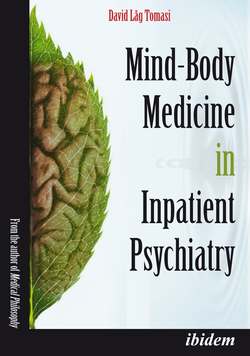Читать книгу Mind-Body Medicine in Inpatient Psychiatry - David Låg Tomasi - Страница 8
На сайте Литреса книга снята с продажи.
Introduction
Оглавление“Patient-centered medicine means mind-centered and body-centered therapy”
This analysis focuses on a multidisciplinary approach for the therapeutic interventions in an inpatient psychiatry setting. More specifically, we were interested in combining statistical analyses of therapeutic offerings, patient attendance and participation over time, and specific theoretical paradigms with direct observations, to create a very accurate picture of the efficacy, effectiveness, and efficiency of the current standardized treatment for patients and strategies for the amelioration of scheduling aspects on one side, and therapeutic changes on the other. In the hope of offering positive suggestions and advice to other medical institutions—also as a way to improve awareness of possible mistakes, obstacles and setbacks vs. optimized clinical and organizational strategies—our analysis is based on the clinical work and data collected via multiple research studies at the University of Vermont Medical Center Inpatient Psychiatry Unit. Furthermore, we also wanted to elucidate the distinctions, special features and similarities in often overlapping fields such as psychotherapy, psychology, and psychiatry from such perspectives. Given the very complex issues at hand, and the very nature of mental health and human nature, empirical data have also been re-interpreted via meta-analyses as well as through philosophical investigations, which we deem fundamental for any work conducted in the fields above. Thus, some of the theoretical elements hereby presented have been discussed, albeit more generally and without a focus on specific therapeutic strategies and standardization processes, in other works, especially “Medical Philosophy” and “Critical Neuroscience” as well as specific peer-review articles as reported in the bibliographical references at the end of this volume. For the direct clinical observations instead, we have worked with multiple teams in the Inpatient Psychiatry Unit at the University of Vermont Medical Center, also in collaboration with other departments, in particular the University of Vermont Department of Rehabilitation and Movement Science, the University of Vermont College of Nursing and Health Sciences, the University of Vermont Larner College of Medicine, and the University of Vermont Integrative Health. We are also very thankful to the precious work of the University of Vermont Medical Center Volunteer Department and the University of Vermont Medical Center Department of Clinical Ethics for their continuous support. Furthermore, this work also attempts to investigate the conceptual issues at the center of epistemological and methodological frameworks aimed at understanding the placebo/nocebo effects in psychiatry, with a special focus on medical perspectives on mind-body connection and an emphasis on mental health. Implementing cutting-edge scientific discoveries with a solid philosophical investigation is fundamental in order to avoid possible therapeutic and epidemiological errors and provide a solid theoretical background to those areas of scientific investigation still open to clinical trials, diagnosis and statistical analysis. In particular, the focus on the connections, as well as the differences, between terms such as perception and consciousness fosters the combination of data collected through neurobiological experimentation, especially in neuroimaging, and the philosophical debate on the applicability of such terms in the context of the human healing process. Thus, new perspectives on the reality and reason, in causal terms, of certain healing mechanisms are discussed beyond the current bio-psycho-social standpoint. Thus, the research study at the center of this proposal focuses on Mind-Body Medicine strategies (psychotherapy-based interventions, body activation vs. relaxation techniques, and other integrative approaches) to improve clinical outcomes in inpatient psychiatry settings. More specifically, multidisciplinary approaches in the areas of clinical psychology and behavioral medicine have been utilized to better support the healing process and treatment plans for patients with multiple mental health diagnosis.
